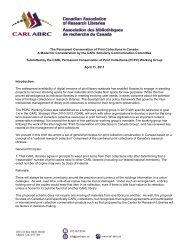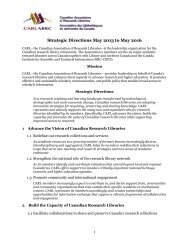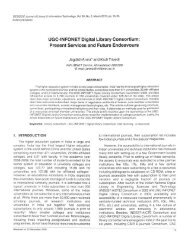PDF - CARL - ABRC
PDF - CARL - ABRC
PDF - CARL - ABRC
You also want an ePaper? Increase the reach of your titles
YUMPU automatically turns print PDFs into web optimized ePapers that Google loves.
Toronto, and University of Calgary. The purpose of the project is to bring Canadian<br />
humanities and social sciences journals online. It aims to develop a non-profit national<br />
infrastructure for Canadian scholarly publishing that will eventually expand beyond social<br />
sciences and humanities. 170 Canadian journals are currently participating in the project.<br />
The journals are mostly hosted by a university library, aggregated to the regional node, and<br />
made available through the national Synergies portal. The Synergies project has been led<br />
in large part by Érudit, a multi-institutional publishing consortium comprising the<br />
Université de Montréal, the Université Laval and the Université du Québec à Montréal,<br />
which has been instrumental in providing online access to Quebec, French-language<br />
journals. Synergies Canada was funded through a Canada Foundation for Innovation grant,<br />
provincial partners, and institutional operating funds.<br />
3. Open access is a growing international movement that calls for the free availability of<br />
scholarly output over the Internet. Open access (OA) targets the peer-reviewed journal<br />
literature, for which authors receive no financial compensation, although in some cases OA<br />
is being adopted for scholarly monographs. Open access can be achieved in two ways:<br />
through open access publications or open access self-archiving, which involves depositing<br />
a copy of a subscription-based publication into an open access repository.<br />
The concept of OA emerged in 2001 out of a meeting organized by the Open Society<br />
Institute in Budapest. Since then, its popularity has grown steadily. Authors who support<br />
open access do so because it broadens their readership, and governments support it because<br />
it makes research knowledge funded by taxpayers available to the public. Forthcoming<br />
funding agency and university mandates requiring authors to make their publications open<br />
access will likely further strengthen the prospects for open access.<br />
Universities are the backdrop for most of the innovative approaches to scholarly publishing being<br />
adopted in Canada. Open access journals are steadily moving into the mainstream and open<br />
access monographs are starting to appear. E-books and print on demand services are being<br />
embraced by both university presses and libraries. A growing number of independent scholars,<br />
scholar collaboratives, and student groups are publishing their own peer-reviewed materials. And,<br />
Canadian libraries are becoming more active in publishing and dissemination, through the<br />
implementation of institutional repositories and journal hosting services.<br />
A common theme running through many of the initiatives identified for this review is that they<br />
are the result of collaborations amongst different communities. Working together, libraries,<br />
publishers, and scholars are better able to find creative solutions to publishing in a rapidly<br />
evolving environment. In addition, collaborations can help to mitigate the risks inherent in change<br />
for all participants involved. It is reasonable to assume that strengthening these partnerships and<br />
4












